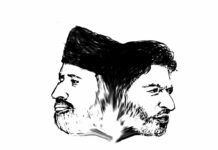Dr Sheikh Showkat Hussian
The recent Pakistani election remains historic in several ways. It was for the first time that a smooth transfer of power from one civilian government to another took place. Prior to this, Army takeover or agitations led to change. The neutrally-administered elections which were held after completion of full tenure of a civilian government led to the change of guard from one political party to another. Those who led the neutral government were mostly the ones who had been in good books of the previous government and were having proximity to its ideology.The caretaker chief minister of Punjab Najam Sethi for example is a known propagator and promoter of liberal ideology of which people’s party remains a champion.
All the above factors are institutional and political. From operational point of view, the elections were successful. There was a huge turnout of voters despite threats of Taliban and suicide bombers. Results were on expected lines. Pakistan received nothing apart from drone attacks and instability out of its involvement in war on terror. Musharraf took his nation on board by promising that Americans will on one side provide economic aid and on the other side play a pro-active role in the settlement of Kashmir problem. Involvement of Pakistan in war on terror led to flight of capital from the country. Pakistan did get a few billion dollars but the costs of participation in war on terror were hundreds of times more than the amount received in aid.
Resolution of Kashmir issue remains in illusion though a fake impression was given to Musharraf that India was ready to settle it. Pakistan remains completely infested with anger and hatred against Americans. Pakistani voter made it a point to defeat all those who some way or other remained associated with Americans or were in proximity of those who subscribe to the so-called enlightened moderation of General Musharraf.
They cast their votes in favor of pro-Islamist groups and somewhat negative towards liberalism. It was Musharraf’s patronization that led Awami National Party to power. Despite playing the card of Pakhtoon nationalism by naming North West Frontier Province as Khyber Pakhtoonkhaw, the party was completely wiped out in its stronghold. Pathans voted in favour of the parties which opposed war on terror. Pakistan People’s Party was perceived to be more cordial to India as compared to Muslim League. Indians can’t expect many concessions from Muslim League in a scenario where Imran Khan remains leader of opposition and potent challenge to the government.
Concessions on Kashmir again remain elusive because Nawaz Sharief is an ethnic Kashmiri and depends upon the Kashmiri vote bank within Punjab. Punjab Province of Pakistan has a population of eight million Kashmiris who, like the ancestors of Iqbal and Pandit Nehru, settled there in eighteenth century while the valley was infested with epidemics and floods. Though a minority, they remain a potent group on account of high levels of educations and penetration within business and bureaucracy. Mr Ishaq Dar, the incumbent finance minister too comes from this group.
In spite of the above assessment, Kashmiris need to be vigilant lest businessman and industrialist within Nawaz Sharief don’t prevail upon his ethnicity and Muslim League ideology. India may use incentives of trade and business to win over Nawaz Sharief to the detriment of Kashmir cause.
Author can be mailed at [email protected]
















Economic stability of Pakistan, if achieved in recent future can also effect Kashmir Stand. It is evident and true enough that India has strong military as well as strong economy then Pakistan. Mainstream Political street show in IOK, is also the greatest halt to dispute accompanied with leaderless separatist camp, especially since 2004. Unless there is unified voice against oppressor, manas will continue to fall from heaven for oppressor.